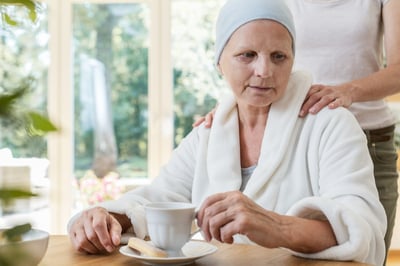Ovarian Cancer



Relevance: High
Most relevant for: People with advanced ovarian cancer
Study: What influences aggressive end-of-life care for ovarian cancer?
Aggressive medical treatment is often given to people with terminal ovarian cancer when prior treatment has stopped working. This aggressive end-of-life treatment conflicts with clinical guidelines, may increase pain and suffering and does not extend life. This study found that the end-of-life care that a person with ovarian cancer receives is influenced by their doctors. (Posted 1/3/23)
Este artículo está disponible en español.
READ MORE ›


Relevance: High
Most relevant for: Americans Indians and Alaska Natives
Topic: Cancer disparities in American Indian and Alaska Native populations
The American Cancer Society released a special section in their 2022 Cancer Facts & Figures report that discussed cancer disparities in American Indian and Alaska Native populations in the United States. This review highlights the special section’s main points, including disparities in cancer screening, diagnosis and survival rates in native communities, as well as factors contributing to those disparities. (Posted 12/20/22)
Este artículo está disponible en español.
READ MORE ›


Relevance: Medium-High
Most relevant for: People currently undergoing treatment for cancer
Guideline: Guidelines on exercise, diet, and weight during cancer treatment
Most professional guidelines on exercise, diet and weight management have focused on the health of the general population and cancer survivors. The American Society of Clinical Oncology (ASCO) has now published evidence-based recommendations for exercise, diet and weight specifically for people who are in active treatment for cancer. (Posted 11/29/22) Este artículo está disponible en español.
READ MORE ›


Relevance: Medium-High
Most relevant for: People taking a PARP inhibitor for ovarian cancer maintenance therapy
Study: More is not better: PARP dose can be safely reduced for people with ovarian cancer
Maintenance therapy with a PARP inhibitor is now the standard of care for many people with advanced or recurrent ovarian cancer. However, PARP inhibitors may have significant side effects. This study shows that reducing the dose of a PARP inhibitor does not affect survival. (Posted 11/8/22)
Este artículo está disponible en español.
READ MORE ›


Relevance: Medium-High
Most relevant for: Mothers who have had genetic testing for BRCA1 or BRCA2 whether or not they have been diagnosed with breast or ovarian cancer
Study: Teens and young adults respond well to learning about familial cancer risk
Little is known about how awareness of hereditary cancer in a high-risk family affects the quality of life of teens and young adults. This study looked at the lifestyle choices, cancer awareness and quality of life of adolescents and young adults whose mothers had undergone testing for a BRCA mutation. (Posted 10/11/2022) Este artículo está disponible en español.
READ MORE ›


Relevance: High
Most relevant for: people with recurrent ovarian cancer who have received 3 or more prior lines of treatment and who have an inherited or tumor mutation in BRCA1 or BRCA2 or whose tumor is HRD positive
Update: PARP inhibitors withdrawn as third-line or later treatment for recurrent ovarian cancer
Survival data from a clinical trial signaled that PARP inhibitors may not work as well as chemotherapy for patients with recurrent ovarian cancer who have received three or more lines of treatment. As a result, FDA approvals have been withdrawn for PARP inhibitors in this setting. This does not affect PARP inhibitor approvals for use as maintenance therapy for ovarian cancer. (Posted 10/4/22)
Este artículo está disponible en español.
READ MORE ›


Relevance: Medium-High
Most relevant for: Cancer patients who are experiencing fatigue related to cancer or its treatment.
Study: Physical activity may decrease fatigue associated with cancer treatment
Many cancer survivors experience fatigue during and after they complete treatment. This study looked at the effect of home-based physical activity on fatigue in cancer survivors. It also looked at whether frequent counseling encouraged people to start and continue their exercise routines. (Posted 8/1/22). Este artículo está disponible en español.
READ MORE ›


Relevance: High
Most relevant for: People diagnosed with ovarian cancer
Article: How your ovarian cancer diagnosis can help your relatives
This media article provides tips from experts and the CDC for talking to family members after a diagnosis of ovarian cancer. It highlights which family members may be at risk of developing ovarian cancer or passing on genes that increase risk. The article provides links to resources, talking points, alternative methods of communication and potential reactions. (Posted 7/28/22)
Este artículo está disponible en español.
READ MORE ›


Relevance: Medium-High
Most relevant for: People with an inherited BRCA mutation
Study: Risk-reducing ovarian cancer surgery and quality of life
People with an inherited BRCA gene mutation are recommended to have surgery to remove their ovaries before the age of natural menopause to reduce their risk of ovarian cancer. This surgery can cause short-term and long-term effects. This study assesses the quality of life among people who have their fallopian tubes surgically removed and later have their ovaries removed compared to people who have their ovaries and fallopian tubes removed at the same time. (Posted 7/26/22). Este artículo está disponible en español.
READ MORE ›


Relevance: High
Most relevant for: People who are experiencing side effects due to cancer treatment or cancer.
Study: The hidden financial burden of treating cancer care symptoms
Drugs commonly used to treat symptoms of cancer and cancer treatment side effects can cost thousands of dollars out of pocket for patients, depending on what drugs are used. (Posted 6/29/2022). Este artículo está disponible en español.
READ MORE ›